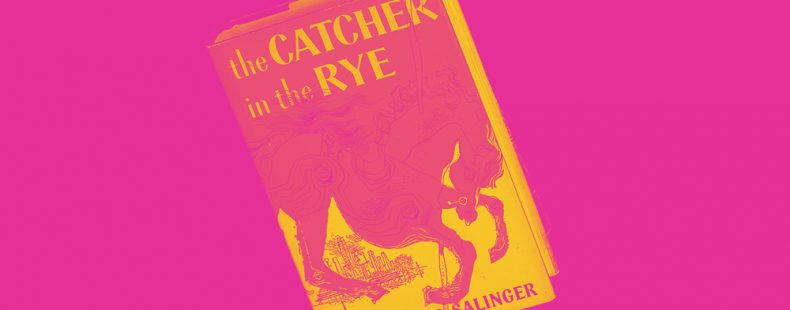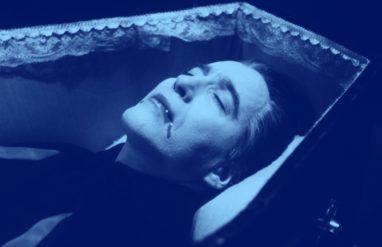WATCH: Can You Correct These Grammatically Incorrect Song Lyrics?
Sometimes it’s hard not to hum that song that’s stuck in your head. It’s also incredibly satisfying when you’re able to hum it all the way through. What you may not realize, however, is that sometimes as you hum your favorite earworm, you might be humming about a piece of literature, motifs and all. Take a look at the rock songs below, and see which ones have made it on to your playlist—whether you consider yourself an avid reader or not!
“You’re Gonna Go Far, Kid” by The Offspring (Lord of the Flies)
The Offspring may not be the first band you’d think of to have referenced a classic piece of literature. Formed in California during the ’80s, the punk band is arguably most known for the tongue-in-cheek “Pretty Fly (For a White Guy)” track off their Americana album. For a band that also released a song titled “Hit That,” who knew they’d eventually pen a song stemming from a seriously heavy allegory?
On the surface, Lord of the Flies is a story by William Golding about what happens when a bunch of little boys are left to their own devices after crashing on an uninhabited island. Below the surface, it explores themes such as religion, deception, and how people succumb to mob mentality as a mode of survival. This is best exemplified by the words, “Another clever word / Sets off an unsuspecting herd / And as you step back into line / A mob jumps to their feet.”
Oh wait … that’s from The Offspring’s “You’re Gonna Go Far, Kid,” a 2008 single that translated Golding’s subject matter into song. Although there’s no direct mention of kids on an island, the themes of abuse of power as well as the struggle to survive are all there.
“Ramble On” by Led Zeppelin (The Lord of the Rings)
Led Zeppelin isn’t all about black dogs and stairways to heaven; the London-hailing band also has quite the thing for J.R.R. Tolkien’s The Lord of the Rings. Led Zeppelin has made various references to Middle Earth and its inhabitants in many of their songs, most noticeably in their 1969 single, “Ramble On.” If you’re not entirely convinced that such hard rockers could also be avid Tolkien fans, here’s a taste of some of the lyrics from the song: “’T was in the darkest depths of Mordor / I met a girl so fair / But Gollum, and the evil one / Crept up and slipped away with her.”
As a quick refresher, Mordor is where Frodo and his companion, Sam, must travel in order to destroy the One Ring. Gollum and the “evil one” (Sauron) are two antagonists who want to keep the Ring in one piece. The question now is, would Tolkien have been a Led Zeppelin fan?
“White Rabbit” by Jefferson Airplane (Alice’s Adventures in Wonderland)
Jefferson Airplane shot to stardom during the ’60s as the poster children of psychedelics. The band continued to gain notoriety (in particular, their lead singer, Grace Slick) throughout the decades for their Man-fighting antics. Before they fought the Man, however, they were singing about Alice’s Adventures in Wonderland.
Released in 1967, “White Rabbit” is a song about a trip in more ways than one. Aside from the obvious nod in the song’s title, “White Rabbit” is a tribute to Lewis Carroll’s Alice’s Adventures in Wonderland. The lead singer follows her curiosity into a land where “one pill makes you larger, and one pill makes you small.” This, along with such references as hookah-smoking caterpillars and mushrooms, are directly pulled from Alice’s own adventures in the book. It’s also inspired by Slick’s own experience with LSD, something that is most certainly not in Carroll’s original publication.
“Who Wrote Holden Caulfield?” by Green Day (The Catcher in the Rye)
The members of Green Day could be summed up in one word: angsty. The trio sings about broken dreams, dons dark clothes, and wears black eyeliner. See? Angsty. Had he been a real person, literature’s angstiest teen, Holden Caulfield, would most certainly have been a groupie. He would have been even more pleased that the band dedicated an entire song to him—and the novel he appears in—back in 1991.
“Who Wrote Holden Caulfield?” is a song about a boy who’s frustrated, unmotivated, and whose attempts to take a stand always end with him sitting on down. J.D. Salinger would recognize this boy well: it’s the exact Holden Caulfield he depicted in his 1951 novel, The Catcher in the Rye, who was disenchanted with life while constantly looking for something better. Green Day’s lead singer—Billie Joe Armstrong—sought to honor Holden in song after supposedly gaining an appreciation for the book as an adult. There’s a strong chance Holden would have gotten on the guyliner trend as well.
“Purple Haze” by Jimi Hendrix (Night of Light)
Before he was a guitar-playing genius, Jimi Hendrix was known as “Buster,” a kid who idolized superhero Flash Gordon and loved to draw spaceships. So it wasn’t unusual that one night in 1966, he sat down to write, and he penned page after page of lyrics inspired by the 1957 science fiction novel Night of Light by Philip José Farmer. The words became the basis of “Purple Haze,” so named for an alien planet in Night of Light, which is described as having a “purplish haze.”
“Purple Haze” became the second single for The Jimi Hendrix Experience, the 1960s American-British band helmed by Hendrix. It was released in 1967 and is known as one of the greatest guitar songs recorded (it stands as no. 2 on Rolling Stone’s list). Chas Chandler, Hendrix’s manager and a fellow science fiction fan, claims “Third Stone from the Sun” and “Up from the Skies” also pay tribute to a science fiction novel Hendrix was reading at the time: George Stewart’s Earth Abides.
“Cute Without the E” by Taking Back Sunday (Othello)
Shakespeare’s plot lines are filled with jaded lovers, failed romance, and tragic deaths. So basically, emo stories à la the 1500s. It comes as no surprise, then, that many emo bands have taken inspiration from Shakespeare’s works. Take, for example, Taking Back Sunday.
Taking Back Sunday is a band whose lyrics rely heavily on themes of betrayal, broken hearts, deception, and revenge. All of these culminate into their single “Cute Without the E,” in which frontman Adam Lazzara chirps about how paranoid and angry his girlfriend’s supposed infidelity is making him. Many listeners have pointed out the similarities between the song and Othello, probably one of the most extreme stories of jealousy gone wrong. Unlike Othello, Taking Back Sunday features way more hair flips and lip rings.
“Exit Music (For a Film)” by Radiohead (Romeo and Juliet)
Shakespeare’s Romeo and Juliet has served as the archetypal tale of star-crossed lovers and the craziness caused by teenage hormones for the past 500 years or so. The tragedy has gone on to inspire numerous film adaptations, including Baz Luhrmann’s 1996 Romeo + Juliet. It was this film (and, of course, the original play) that inspired Radiohead’s Thom Yorke to pen “Exit Music (For a Film).”
“Exit Music (For a Film)” never made it to Luhrmann’s soundtrack, but did end up as a track on Radiohead’s OK Computer. When asked about the song, Yorke described his own reflections on why Romeo and Juliet simply hadn’t eloped. The lyrics detail teenagers packing up and sneaking off, leaving behind the prejudice of their parents. It’s a happier twist covered beneath some chilling chords.
“Love” by Prince (Bible)
Fans love to comb through Prince’s lyrics searching for the inspiration in the hundreds of songs he released. The Bible appears as a recurring theme in his recordings; his song “And God Created Woman” retells the story of Adam and Eve (with Prince singing as Adam, of course). Some of his references are a little more obscure, including a lyric in the song “Love,” which goes: “Like a bird flying over the hilltops / Love is like the sky you know it never stops / From the abundance of the heart the mouth speaks / Love is whatever, whatever, you want it to be.” It was inspired by Luke 6:45, in which Jesus says, “A good man out of the good treasure of his heart brings forth good … for out of the abundance of the heart his mouth speaks.”
While we may never know what the song “7” refers to (is it the seven deadly sins or what?), we do know Prince became a devout Jehovah’s Witness in 2001 and even knocked on doors to speak about his faith. The musician who could play 27 instruments is known as one of the best-selling artists of all time.
“Off to the Races” by Lana Del Rey (Lolita)
Another work of Baz Luhrmann’s, the 2013 film adaptation of The Great Gatsby, featured Lana Del Rey’s ethereal vocals on its hit single “Young and Beautiful.” The film’s soundtrack, however, was not the singer’s only brush with literature via lyrics.
“Off to the Races” was a divisive single with regards to critical reception. Some loved it for its new sound, others were not so keen on the way Del Rey “raps” some of the lyrics. Criticisms aside, the lyrics of “Off to the Races” are a nod to Vladimir Nabokov’s Lolita. The novel’s narrator, Humbert Humbert, coos to the underage object of his affections, “Lolita, light of my life, fire of my loins,” a line which Del Rey repeats in the song. The single’s music video even positions Del Rey as a modernized version of Lolita herself. Del Rey was in her 20s when the video was released, however, for those who are wondering …
“To The End” by My Chemical Romance (“A Rose for Emily”)
For some, My Chemical Romance represents the epitome of the early 2000s emo scene. Based in New Jersey, the band drew inspiration for their name from the Irvine Welsh novel Ecstasy: Three Tales of Chemical Romance.
It’s no surprise, then, that one of their songs would also draw inspiration from another literary narrative, and a creepy one at that. “A Rose for Emily” is a short story by William Faulkner, an American author known best for his Southern Gothic vibe. The story stays true to this style as it tells the sad tale of the titular character, Emily, a fallen Southern aristocrat who falls in love. This sounds more depressing than disturbing, until you make it to the story’s end, and the corpse of Emily’s lover—who disappeared under mysterious circumstances—is found in her bed after her funeral. “To The End” echoes the story of a lover killed via obsessive love (and cyanide), and the groom finds his “mansion not a house / but a tomb.” Talk about emo.
Looking for more books that have influenced music? Read about the classics here!
Books and their authors have even further influence, too. Just look at this wonderland of words created by Lewis Carroll or these words popularized by William Shakespeare.














